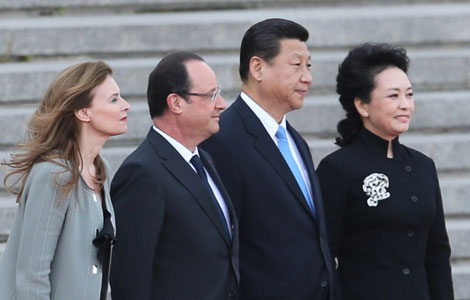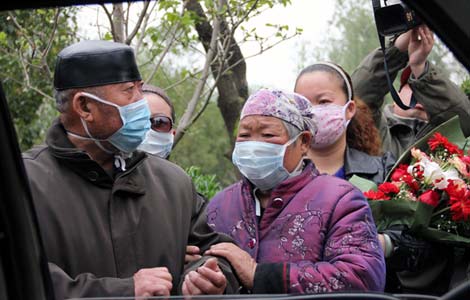Prices at scenic spots to go down
Updated: 2013-04-26 08:15
By Zhao Yinan (China Daily)
|
||||||||
|
Tourists enjoy whitewater rafting at Chaotianhou in Xingshan county, Hubei province, on Tuesday. The stretch of river is 5 km long and descends 100 meters from start to finish. Wen Zhenxiao / for China Daily |

Law makers approve first legislation covering tourist market in China
A senior official from China's top economic planner said on Thursday that the entry fee at scenic spots should gradually go down, since they are natural and ancient resources that belong to the public.
In the first official response to the high-profile pricing dispute in Fenghuang, Hunan province, Wang Wei, director of the Social Development Department under the National Development and Reform Commission, said natural resources and ancient relics are masterworks made by nature and the Chinese people's ancestors, so they should belong to all Chinese as well as people from all over the world.
"We should never draw a line between visitors who have paid money and those who have not, but we should encourage all of them to appreciate and enjoy the masterpieces," Wang said.
"In general, the ticket price will go down gradually in the future."
Wang made the remarks at a news conference on Thursday when the National People's Congress Standing Committee, the top legislature, passed the Tourism Law after three readings.
The law, which will take effect in October, marks China's first legislation covering the tourist market. It will apply to China's domestic travel market, which is now the world's largest and ranks third globally in terms of overseas tourists.
During the three readings, which began in August, the law drew widespread attention as the public hoped it would curb the trend of rising entry fees at scenic spots.
Fenghuang, an old town in Hunan province that is known for its 300-year-old architecture, started charging visitors an entry fee of 148 yuan ($24) this month. Many other tourist sites followed suit.
In a notice issued in 2007 by the NDRC, the top economic planner, ruled that scenic areas could change admission fees only once in three years. March marks the start of the second three-year cycle, and many tourist sites have raised their entrance fees.
"Their practice is contradictory to our original intention. Our three-year-no-raise policy has in fact become a three-year-must-raise. There are places that lowered the price or even canceled the entry fee, which may even be beneficial to their overall economic results," Wang said.
The law said the tourist sites should provide tourists with six months' notice before a price hike. Those built on public resources, such as natural scenery and ancient relics, should hold hearings six months before raising prices to solicit opinions from tourists and business owners on whether the charges are necessary and reasonable.
Wang admitted canceling the entry fee for all tourist spots is unrealistic at the moment.
"We will try to work out a solution that can satisfy all parties in the issue, and we are considering allocating more revenue to support tourist areas," he said.
Ticket revenue for China's 153 national 5A-level scenic spots and more than 2,000 4A-level ones generated more than 40 percent of the country's 140 billion yuan in ticket sales in 2012, according to Yang Yanfeng, associate researcher with China Tourism Academy.
Yang Congyu, a college teacher in Beijing, said she welcomed the restriction on raising prices, which she said protects the rights of tourists.
"But I'm concerned there will be a lot of price hikes between now and October, since the law will only be effective in six months," she said.
Yang said she is also concerned about how revenue from the tickets is being used.
"How much is being spent to restore the relics or to protect the natural resources? Local governments running these tourist spots have the responsibility to release this information to the public."
zhaoyinan@chinadaily.com.cn
(China Daily 04/26/2013 page3)
Most Viewed
Editor's Picks

|

|

|

|

|

|
Today's Top News
Phone bookings for taxis in Beijing
Chinese consumers push US exports higher
Seoul delivers ultimatum to DPRK
Boston bombing suspects intended to attack NYC
No let up in home price rises
Bird-watchers undaunted by H7N9 virus
Onset of flood season adds to quake zone risks
Vice-president Li meets US diplomat
US Weekly

|

|















